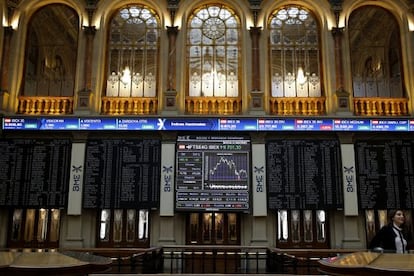Markets react skittishly to election
Ibex 35 retreats and borrowing costs rise following new scenario of political uncertainty

The markets reacted skittishly to Sunday’s general election results in Spain.
The Spanish Ibex 35 retreated more than 3.6% on Monday, while the risk premium – the gap between Spanish and German 10-year borrowing costs – rose slightly from Friday, by around seven basis points, after experiencing higher increases earlier in the day.
The new scenario of political uncertainty that opens up following a highly fragmented vote was not to the liking of international investors, who are hoping that Spain will remain on the path of reform and economic growth.
As a rule, investors do not like change, much less if no clear majorities emerge from an election
Their ideal situation would be an alliance of the conservative Popular Party (PP) and the pro-market Ciudadanos. But the 123 and 40 seats they obtained on Sunday are not enough for a clear majority.
Instead, it is theoretically possible for the left to reach a governing alliance if the Socialists (who came in second), Podemos (third) and others team up. This is a highly undesirable scenario for the markets, as the anti-austerity Podemos has stated its intention to undo some of the PP’s reforms.
The market reaction was nothing unexpected, however. As a rule, investors do not like change, much less if no clear majorities emerge from an election. When the Socialists won the 2008 election, the Ibex lost 0.29% the following day.
At the previous ballot of 2004, the blue-chip index retreated 4.15% on Monday. And in 1996, when the center-right PP won the vote but required deals to create a stable government, the Spanish index tumbled 5.22%.
As for rising borrowing costs, they are still not a significant issue. Bond yields are at historical lows thanks to the European Central Bank’s debt purchase program, which is scheduled to remain in place at least until March 2017.
English version by Susana Urra.
Tu suscripción se está usando en otro dispositivo
¿Quieres añadir otro usuario a tu suscripción?
Si continúas leyendo en este dispositivo, no se podrá leer en el otro.
FlechaTu suscripción se está usando en otro dispositivo y solo puedes acceder a EL PAÍS desde un dispositivo a la vez.
Si quieres compartir tu cuenta, cambia tu suscripción a la modalidad Premium, así podrás añadir otro usuario. Cada uno accederá con su propia cuenta de email, lo que os permitirá personalizar vuestra experiencia en EL PAÍS.
¿Tienes una suscripción de empresa? Accede aquí para contratar más cuentas.
En el caso de no saber quién está usando tu cuenta, te recomendamos cambiar tu contraseña aquí.
Si decides continuar compartiendo tu cuenta, este mensaje se mostrará en tu dispositivo y en el de la otra persona que está usando tu cuenta de forma indefinida, afectando a tu experiencia de lectura. Puedes consultar aquí los términos y condiciones de la suscripción digital.








































